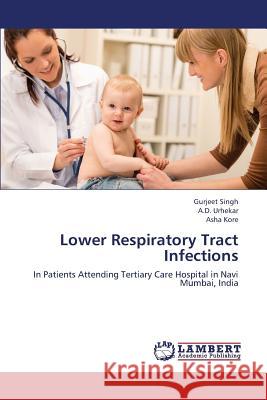Lower Respiratory Tract Infections » książka
Lower Respiratory Tract Infections
ISBN-13: 9783659396755 / Angielski / Miękka / 2013 / 108 str.
Lower respiratory tract infections (LRTIs) are commonest infectious disease in humans worldwide and account for high mortality and morbidity. Prevalence of the LRTIs is generally much more in elderly and paediatric age groups. Resistance to common antibiotic drugs in lower respiratory tract pathogens is a global problem. Sputum samples were collected in a sterile wide mouth universal container and then examined macroscopically and microscopically. Samples were inoculated on blood agar, MacConkey's agar and chocolate agar and incubated at 37 C for 24-48 hours. Organisms were identified by using standard methods. Antibiotic sensitivity was carried out by Kirby-Bauer disc diffusion method according to CLSI guidelines. The incidence of LRTIs was 65.59% observed. Males were more infected than females. LRTIs of patients were mainly caused by Streptococcus pneumoniae 40.54% followed by Klebsiella pneumoniae 21.62% and Pseudomonas aeruginosa 13.51%. Most of the organisms were sensitive to ampicillin/sulbactam, linezolid, Amikacin and Gentamicin. LRTIs is the most common in out patients. The Linezolid, Amikacin and Gentamicin can be used for treatment of patients with LRTIs."
Lower respiratory tract infections (LRTIs) are commonest infectious disease in humans worldwide and account for high mortality and morbidity. Prevalence of the LRTIs is generally much more in elderly and paediatric age groups. Resistance to common antibiotic drugs in lower respiratory tract pathogens is a global problem. Sputum samples were collected in a sterile wide mouth universal container and then examined macroscopically and microscopically. Samples were inoculated on blood agar, MacConkeys agar and chocolate agar and incubated at 37ºC for 24-48 hours. Organisms were identified by using standard methods. Antibiotic sensitivity was carried out by Kirby-Bauer disc diffusion method according to CLSI guidelines. The incidence of LRTIs was 65.59% observed. Males were more infected than females. LRTIs of patients were mainly caused by Streptococcus pneumoniae 40.54% followed by Klebsiella pneumoniae 21.62% and Pseudomonas aeruginosa 13.51%. Most of the organisms were sensitive to ampicillin/sulbactam, linezolid, Amikacin and Gentamicin. LRTIs is the most common in out patients. The Linezolid, Amikacin and Gentamicin can be used for treatment of patients with LRTIs.











